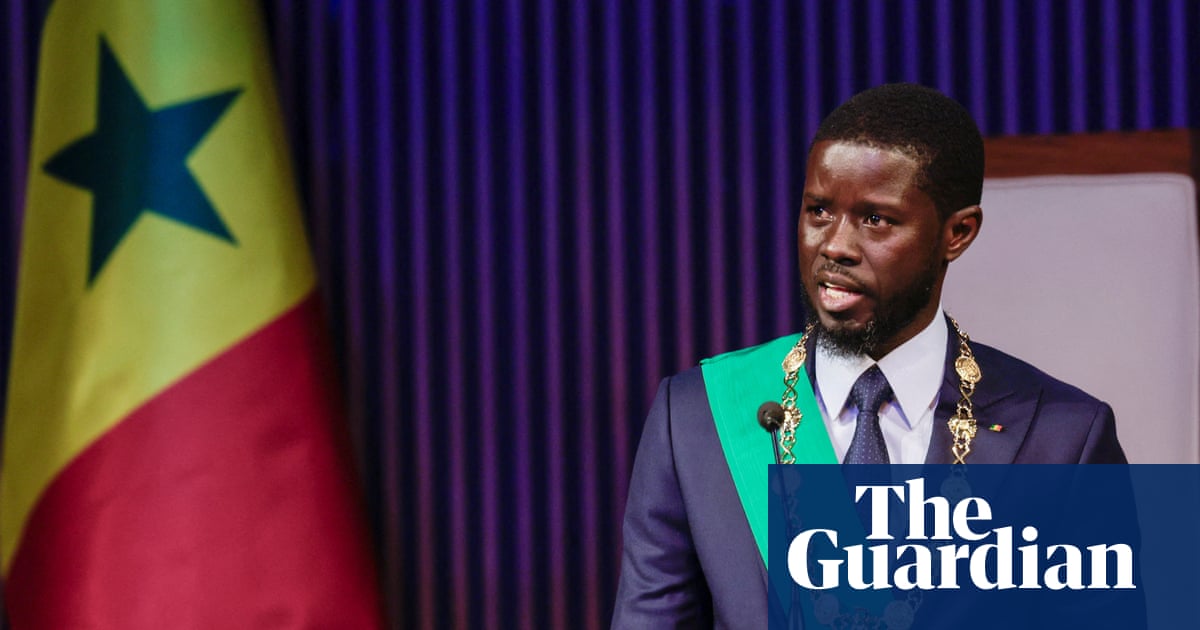
Bassirou Diomaye Faye, a leftwing pan-Africanist, has been sworn in as Senegal’s youngest president, pledging systemic change, greater sovereignty and calm after years of deadly turmoil.
The 44-year-old, who has never held an elected office, swept to a first-round victory on a promise of radical reform just 10 days after being released from prison.
“Before God and the Senegalese nation, I swear to faithfully fulfil the office of president of the Republic of Senegal,” Faye said before hundreds of officials and several African heads of state at an exhibition centre in the new town of Diamniadio, near the capital, Dakar.
He vowed to defend “the integrity of the territory and national independence, and to spare no effort to achieve African unity”.
The former tax inspector becomes Senegal’s fifth president since independence from France in 1960 and the first to admit to a polygamous marriage.
“I am aware that the results of the ballot box express a profound desire for systemic change,” Faye said in a brief speech after taking the presidential oath. “Under my leadership, Senegal will be a country of hope, a peaceful country with an independent judiciary and a strengthened democracy.”
Faye was among a group of political opponents freed from prison 10 days before the 24 March presidential ballot under an amnesty announced by the previous president, Macky Sall, who had tried to delay the vote.
Faye’s campaign was launched while he was still in detention.
“I have painful memories of the martyrs of Senegalese democracy, the amputees, the wounded and the former prisoners,” Faye said on Tuesday, referring to the past three years of political unrest that left dozens dead and hundreds arrested. “I will always bear in mind the heavy sacrifices made in order never to disappoint you.”
Faye said he clearly heard the “aspiration for greater sovereignty, development and wellbeing” in the west African nation.
He reiterated to foreign partners the need for “Senegal’s openness to trade that respects our sovereignty and meets the aspirations of our people, in a mutually beneficial partnership”.
He also urged “more solidarity” between African countries “in the face of security challenges”.
The formal handover of power with Sall was to take place at the presidential palace in Dakar.
Working with his populist mentor, Ousmane Sonko, who was barred from the election, Faye outlined their priorities in his victory speech: national reconciliation, easing the cost of living crisis and fighting corruption.
On the campaign trail he had vowed to restore national sovereignty over key assets such as the oil, gas and fishing sectors. Faye wants to leave the regional CFA franc currency, which he sees as a legacy of French colonialism, and invest more in agriculture with the aim of reaching food self-sufficiency.
After three tense years and deadly unrest in the traditionally stable country, Faye’s victory was hailed from Washington to Paris, via the African Union and the EU.
The US secretary of state, Antony Blinken, spoke to the president-elect by telephone on Monday and “underscored the United States’ strong interest in deepening the partnership” between the countries, the state department said.
On the international stage, Faye wants to bring military-run Burkina Faso, Mali and Niger back into the fold of the regional Economic Community of West African States (Ecowas).
Commonly known as Diomaye, or “the honourable one” in the Serer language, he won the election with 54.3% of the vote.
It was a remarkable turnaround after the government had dissolved the Pastef party he founded with Sonko in 2014, and Sall had postponed the election.
Faye, a practising Muslim from a humble background with two wives and four children, represents a new generation of youthful politicians. He has voiced admiration for the US former president Barack Obama and the South African anti-apartheid hero Nelson Mandela.
However, Faye and the government will quickly face major challenges. He does not have a majority in the national assembly and will need to build alliances to pass new laws, or call a legislative election, which will become an option from mid-November.
The biggest challenge will be creating enough jobs in a nation where 75% of the 18-million population is under 35 and the unemployment rate is officially 20%. Many young people consider the future to be so bleak they have risked their lives trying to migrate to Europe.
Source: theguardian.com


















